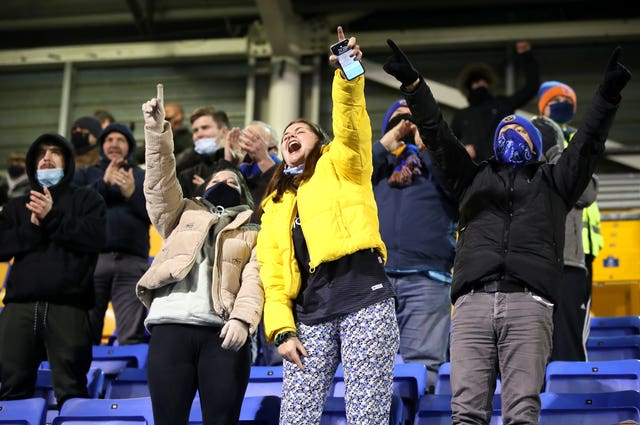The Premier League and EFL have agreed a bailout package which enables lower-league clubs to access £250million of funding to help it through the coronavirus crisis.
Here the PA news agency looks at how we got here, and the detail of the deal.
What has been agreed?
EFL and Premier League statement: Rescue package agreed.#EFL https://t.co/uNfsPoWUno
— EFL Communications (@EFL_Comms) December 3, 2020
The Premier League and EFL have reached agreement on funding to ensure no club goes under due to the Covid-19 pandemic.
Clubs in Leagues One and Two are able to access funding worth £50million, while the Premier League is providing assistance to the EFL which will enable it to secure a £200m loan facility for second-tier clubs.
Will this be enough?
That is the hope. EFL chairman Rick Parry has repeatedly said that the 72 clubs would lose out on a combined £250m in matchday revenue without crowds for the end of the 2019-20 season and the whole of 2020-21.
A £250m package paid as an advance of future television revenues was also what was proposed in the highly controversial Project Big Picture plans which emerged in October, something Parry publicly endorsed.
How will the bailout work?

Clubs in League One will receive a minimum £375,000, and clubs in League Two a minimum of £250,000. They will then receive a share of a £15m pot which will be distributed based on a calculation of lost gate revenue approved by the EFL and the Premier League.
There will then be a further £20million pot available for monitored grants. Clubs can apply for a grant based on need, and it would only be repayable if clubs breach transfer and wage spending restrictions or other EFL financial regulations.
How about the Championship?
The Premier League is providing up to £15m to cover interest costs and arrangement fees on a £200m loan facility.
No club will be able to borrow more than £8.33m and the money is being provided to help meet PAYE liabilities – not to spend on a new striker.
Why is the Premier League helping the EFL?
The Government said it made one of the conditions of giving the green light to 'Project Restart' in the summer – which saved the top flight hundreds of millions of pounds in broadcast rebates – was that it should help out struggling EFL clubs.
The Government's position is a controversial one, with critics pointing out that in no other industry has one part of it been expected to bail out another, and to the fact that other sports such as rugby union – even at Premiership level – and horseracing have received state support.
What has been said?
Parry thanked the Premier League for making "a welcome, tangible commitment to the professional game at a time when it has needed it most".
The Premier League's chief executive Richard Masters said: "The Premier League is a huge a supporter of the football pyramid and is well aware of the important role clubs play in their communities. Our commitment is that no EFL club need go out of business due to Covid-19."
Did the Government welcome it?
With a £250 million support package for men's elite football & £300 million Government funding for women's football, the National League and other major spectator sports we have fuel in the tank to get clubs and sports through this
— Oliver Dowden (@OliverDowden) December 3, 2020
Culture Secretary Oliver Dowden said: "I warmly welcome this deal between the Premier League and the EFL which provides up to £250m support to help clubs through Covid. I'm glad that football has come together to agree this substantial package.
"Fans are starting to return and we look forward to building on this as soon as it's safe. With a £250m support package for men's elite football and £300m Government funding for women's football, the National League and other major spectator sports we have fuel in the tank to get clubs and sports through this."
/https%3A%2F%2Fsportsmole-media-prod.s3.gra.io.cloud.ovh.net%2Fuploads%2F2025%2F11%2Fvinicius-junior-10-6910c3a2b09ad741530501.jpg)
/https%3A%2F%2Fsportsmole-media-prod.s3.gra.io.cloud.ovh.net%2Fuploads%2F2025%2F08%2Fvuskovic-1-68a9b1ed3402c742723037.jpg)
/https%3A%2F%2Fsportsmole-media-prod.s3.gra.io.cloud.ovh.net%2Fuploads%2F2025%2F11%2Fns-3-photo-frame-email-sportmole-3-6925dcd40e382355494614.jpg)
/https%3A%2F%2Fsportsmole-media-prod.s3.gra.io.cloud.ovh.net%2F25%2F21%2Friccardo-orsolini.jpeg)